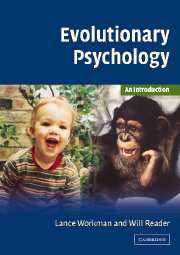Book contents
- Frontmatter
- Contents
- List of figures
- List of tables
- 1 Introduction to evolutionary psychology
- 2 Mechanisms of evolutionary change
- 3 Sexual selection
- 4 The evolution of human mate choice
- 5 Cognitive development and the innateness issue
- 6 Social development
- 7 The evolutionary psychology of social behaviour – kin relationships and conflict
- 8 The evolutionary psychology of social behaviour – reciprocity and group behaviour
- 9 Evolution, thought and cognition
- 10 The evolution of language
- 11 The evolution of emotion
- 12 Evolutionary psychopathology and Darwinian medicine
- 13 Evolutionary psychology and culture
- Glossary
- References
- Index
- References
4 - The evolution of human mate choice
- Frontmatter
- Contents
- List of figures
- List of tables
- 1 Introduction to evolutionary psychology
- 2 Mechanisms of evolutionary change
- 3 Sexual selection
- 4 The evolution of human mate choice
- 5 Cognitive development and the innateness issue
- 6 Social development
- 7 The evolutionary psychology of social behaviour – kin relationships and conflict
- 8 The evolutionary psychology of social behaviour – reciprocity and group behaviour
- 9 Evolution, thought and cognition
- 10 The evolution of language
- 11 The evolution of emotion
- 12 Evolutionary psychopathology and Darwinian medicine
- 13 Evolutionary psychology and culture
- Glossary
- References
- Index
- References
Summary
Key concepts mate guarding, provisioning hypothesis, male parental investment, cryptic oestrus, sexual dimorphism, polygyny, polyandry, reproductive value, sperm competition, sexy sons, Coolidge effect
What does a man look for in a woman? What does a woman look for in a man? To put it more crudely, what criteria do people use when looking for a sexual partner? In chapter 3 we considered sexual selection theory, that is, how morphological and behavioural differences may have come about by enhancing reproductive success. In order to have reproductive success humans need to make decisions about mates. Received wisdom suggests that men and women differ in their predilections for partners. Women want generous, emotionally stable and dependable men, and men – well, men want sexy women. The question is, does the evidence fit with this common-sense view and, if so, where did these differences come from? In this chapter we use sexual selection theory and evidence from other primates to explore the notion of mate choice, its roots and its consequences.
Testing the claims of evolutionary psychologists
Two of the main claims made by evolutionary psychologists are that there is a human nature and that ecological and social pressures of the past were responsible for the evolution of that nature (Pinker, 2002). If this is the case then it might be argued that mate preferences today reflect the decisions of our ancestors.
- Type
- Chapter
- Information
- Evolutionary PsychologyAn Introduction, pp. 81 - 110Publisher: Cambridge University PressPrint publication year: 2004



